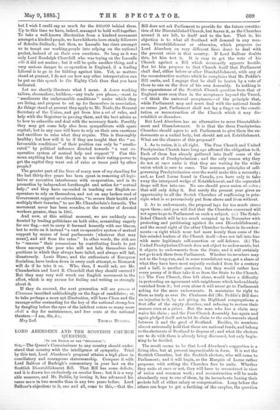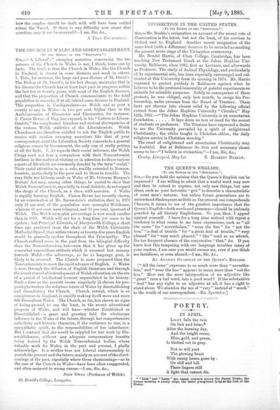LORD ABERDEEN AND THE SCOTTISH CHURCH QUESTION.
ITO THE EDITOR OP THE "SPECTATOR." I SIE,—The Queen's Commissioner to any country should under. stand that country with the intelligence of sympathy. Tried by this test, Lord Aberdeen's proposal attains a high place in conciliatory and courageous statesmanship. Compare it with Lord Balfour of Burleigh's commentary in your last on the Scottish Disestablishment Bill. That Bill has some defects, and it is drawn too exclusively on secular lines ; but it is a very able measure, and Mr. Peddie, by issuing it, has advanced his cause more in two months than in any two years before. Lord Balfour's objections to it, one and all, come to this,—that the Bill does not ask Parliament to provide for the future constitution of the Disestablished Church, but leaves it, as the Churches around it are left, to itself and to the law. That is, his objection is to what all Scotland will demand in any measure, Disestablishment or otherwise, which proposes (as Lord Aberdeen on very different lines does) to deal with the present crisis in that country. If Lord Balfour doubts this, let him test it. It is easy to get the vote of his Church against a Bill which necessarily appears hostile. But let him propose to that Church itself that Parliament shall deal, either before or after Disestablishment, with any of the reconstructive matters which he complains that Mr. Peddie's Bill omits, and I engage that he shall be beaten by a vote of three to one on the floor of his own Assembly. In nothing is the separateness of the Scottish Church question from that of England more seen than in the acceptance beyond the Tweed, —I think the universal acceptance,—of the principle that, while Parliament may and must deal with the national funds as seems just, Parliament shall not lay a finger on the constitution or reconstruction of the Church which it may disestablish or dieendow.
But Lord Aberdeen has an alternative to mere Disestablishment and Disendowment. It is that the three Presbyterian Churches should agree to ask Parliament to give them the endowments as a united body, but should not ask Establishment. What are the chances of this proposal?
1. As to union, it is all right. The Free Church and United Presbyterian Church have long ago affirmed the obligation to it Each of them has already gathered into itself some of the fragments of Presbyterianism ; and the only reason why they do not at once unite is that they are waiting for the wider union which is sure to come. The common principles of selfgoverning Presbyterianism over the world make this a necessity; and, as Lord Lorne found in Canada, you have only to take away the interposed wedge of Establishment, and the separated drops will flow into one. No one should press union ab extra; that will only delay it. But surely the present year gives an opportunity to all the Scotch Churches of reaffirming in principle what is so persuasively put from above and from without.
2. As to endowments, the proposal lays far too much stress upon them ; and you will find that the Churches concerned will not agree to go to Parliament on such a subject. (a.) The Estab lished Church will be too much occupied up to November with protesting and petitioning against its own Disestablishment ; and the moral right of the other Churches to share in its endow ments—a right which none feel more keenly than some of the fair-minded leaders of the Church itself—does not fall into line with mere legitimate self-assertion or self defence. (b.) The United Presbyterian Church does not object to endowments, but it objects to endowments from the State, and it will certainly not go to ask them from Parliament. Whether its members may not in the long-run, and in some roundabout way, get a share of what they have been most unjustly excluded from for a century and a half, is another question ; but they would rather lose every penny of it than take it as from the State to the Church. (c.) The Free Church, thus left alone, would have a difficulty in pretending an agreement with neighbours which had.suddenly vanished from it ; but even alone it will never go to Parliament asking for the mere endowments. It maintains its right to them as truly as ever Dr. Chalmers did (Mr. Peddie's Bill does an injustice to it, by not giving its Highland congregations a first offer of the empty churches, and refusing to restore their manses even at a price). But the man who has a claim may waive his claim ; and the Free Church Assembly has again and again pledged itself not to let its claim to the endowments stand between it and the good of Scotland. Besides, its members almost universally hold that these are national funds, and belong to the electorate of Scotland to dispose of; and what the electors are to do with them is already being discussed, but only beginning to be decided.
The result seems to be that Lord Aberdeen's suggestion is a living idea, but at present impracticable in form. It is net the Scottish Churches, but the Scottish electors, who will come to Parliament; and it will begin, as the Marquis of Lorne rather proposes, with setting the Churches free to unite. Whether they unite at once or not, they will have to reconstruct in view of anion and common work ; and reconstruction will be made abundantly easy to one of them, by its incumbents having their pockets full of either salary or compensation. Long before the others can hope to get a farthing of the surplus, the question how the surplus should be dealt with will have been settled across the Tweed. If there is any difficulty now about that question, may it not be reserved ?—I am, Sir, &c., A FREE CHURCHMAN.



































 Previous page
Previous page